Developing a Systematic Culture Plan for Healthcare Organizations
VerifiedAdded on 2023/04/10
|6
|973
|426
Report
AI Summary
This report focuses on developing a systematic culture plan for healthcare NGOs, emphasizing the crucial role of leadership in its successful implementation. The analysis begins with an introduction highlighting the leader's role as a change agent and the importance of a strong organizational culture. The report outlines the mission statement and company values of the chosen organization, followed by a detailed cultural roadmap. This roadmap involves dividing responsibilities into various committees, including Executive, Management, Therapeutic, Medical Records, Employee Management, Interview, and Development committees. The importance of communication between employees and management is also stressed. The report concludes that a successful organizational culture depends not only on systematic plans but also on the leader's ability to develop an efficient culture. References to relevant literature supporting the arguments are included.
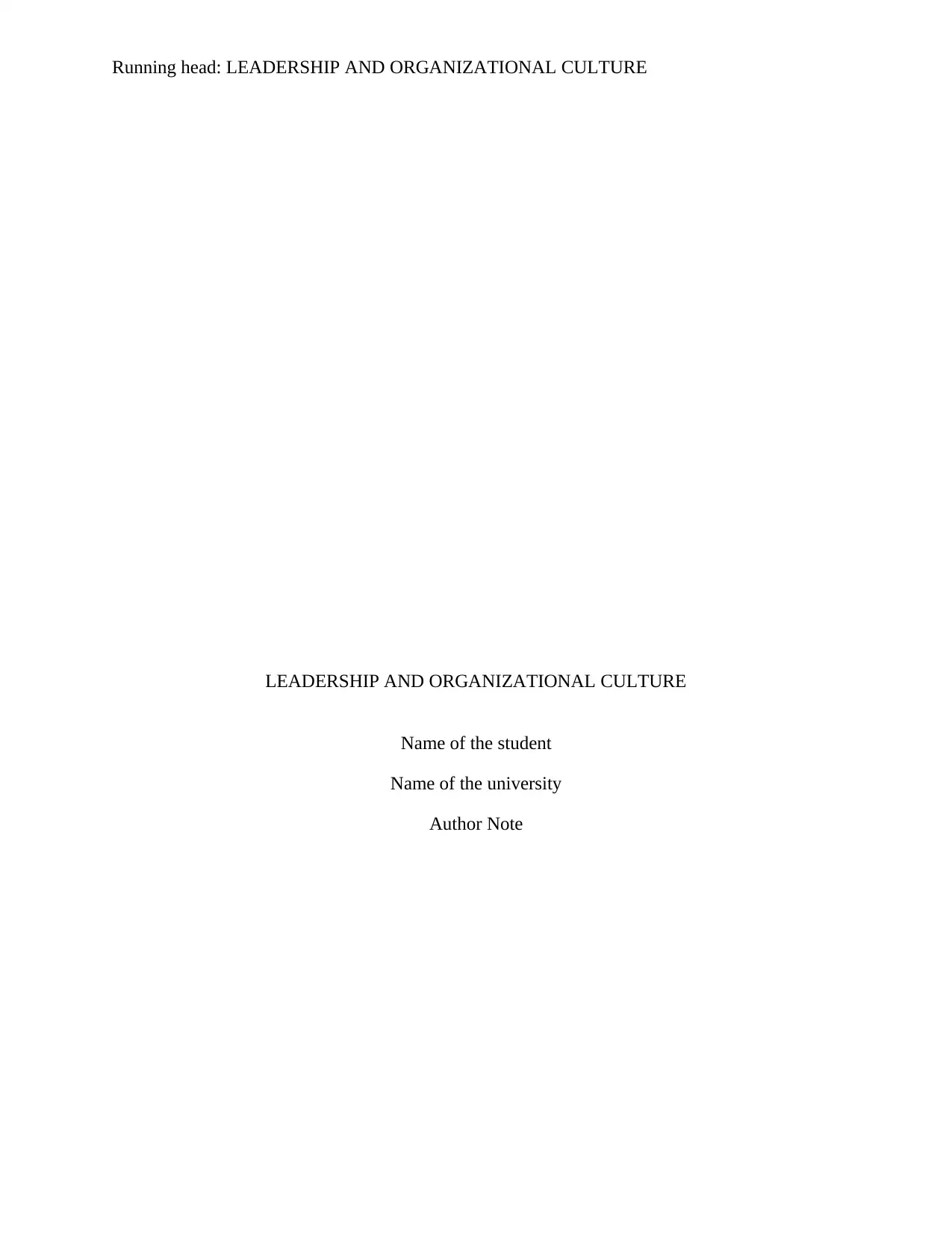
Running head: LEADERSHIP AND ORGANIZATIONAL CULTURE
LEADERSHIP AND ORGANIZATIONAL CULTURE
Name of the student
Name of the university
Author Note
LEADERSHIP AND ORGANIZATIONAL CULTURE
Name of the student
Name of the university
Author Note
Paraphrase This Document
Need a fresh take? Get an instant paraphrase of this document with our AI Paraphraser
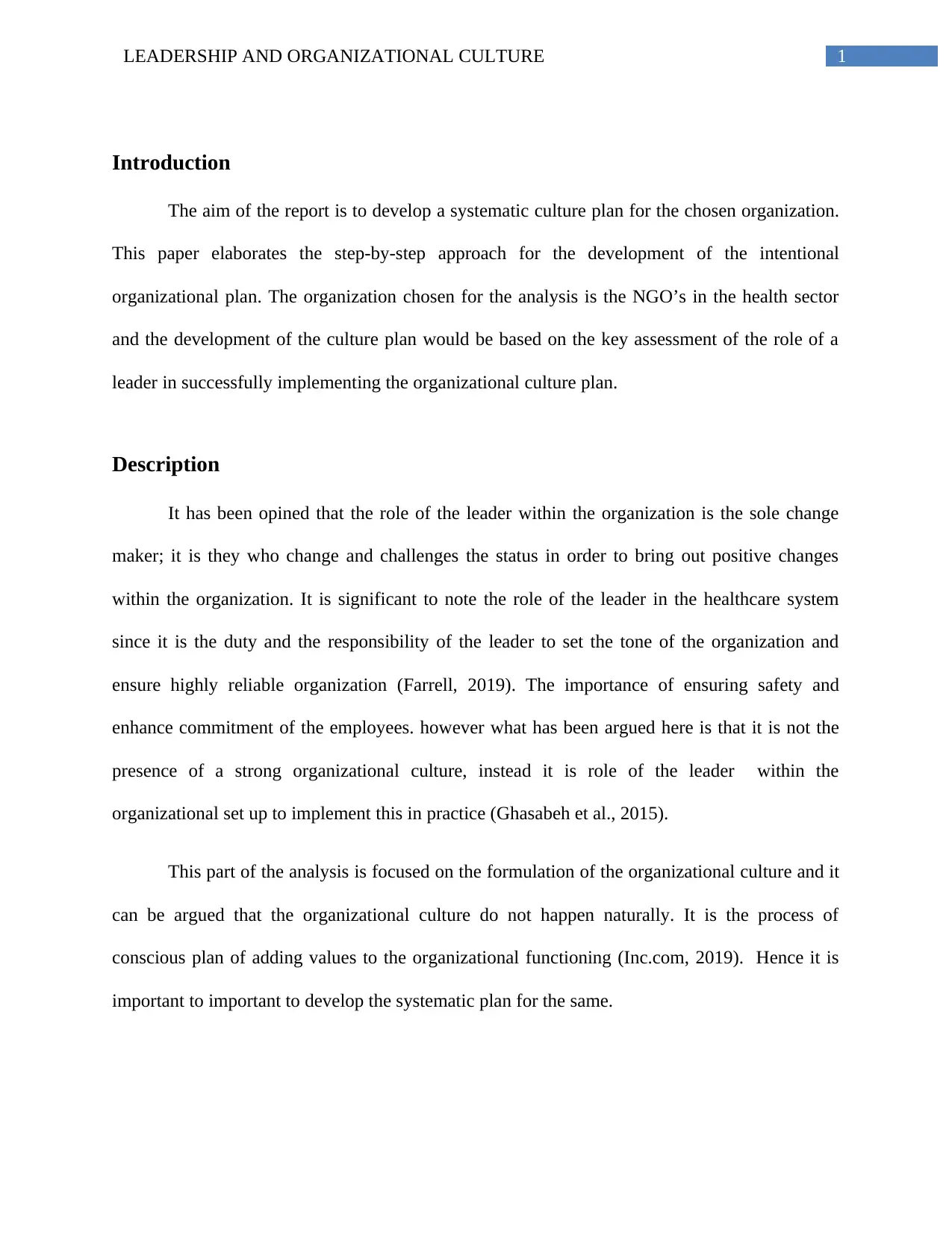
1LEADERSHIP AND ORGANIZATIONAL CULTURE
Introduction
The aim of the report is to develop a systematic culture plan for the chosen organization.
This paper elaborates the step-by-step approach for the development of the intentional
organizational plan. The organization chosen for the analysis is the NGO’s in the health sector
and the development of the culture plan would be based on the key assessment of the role of a
leader in successfully implementing the organizational culture plan.
Description
It has been opined that the role of the leader within the organization is the sole change
maker; it is they who change and challenges the status in order to bring out positive changes
within the organization. It is significant to note the role of the leader in the healthcare system
since it is the duty and the responsibility of the leader to set the tone of the organization and
ensure highly reliable organization (Farrell, 2019). The importance of ensuring safety and
enhance commitment of the employees. however what has been argued here is that it is not the
presence of a strong organizational culture, instead it is role of the leader within the
organizational set up to implement this in practice (Ghasabeh et al., 2015).
This part of the analysis is focused on the formulation of the organizational culture and it
can be argued that the organizational culture do not happen naturally. It is the process of
conscious plan of adding values to the organizational functioning (Inc.com, 2019). Hence it is
important to important to develop the systematic plan for the same.
Introduction
The aim of the report is to develop a systematic culture plan for the chosen organization.
This paper elaborates the step-by-step approach for the development of the intentional
organizational plan. The organization chosen for the analysis is the NGO’s in the health sector
and the development of the culture plan would be based on the key assessment of the role of a
leader in successfully implementing the organizational culture plan.
Description
It has been opined that the role of the leader within the organization is the sole change
maker; it is they who change and challenges the status in order to bring out positive changes
within the organization. It is significant to note the role of the leader in the healthcare system
since it is the duty and the responsibility of the leader to set the tone of the organization and
ensure highly reliable organization (Farrell, 2019). The importance of ensuring safety and
enhance commitment of the employees. however what has been argued here is that it is not the
presence of a strong organizational culture, instead it is role of the leader within the
organizational set up to implement this in practice (Ghasabeh et al., 2015).
This part of the analysis is focused on the formulation of the organizational culture and it
can be argued that the organizational culture do not happen naturally. It is the process of
conscious plan of adding values to the organizational functioning (Inc.com, 2019). Hence it is
important to important to develop the systematic plan for the same.
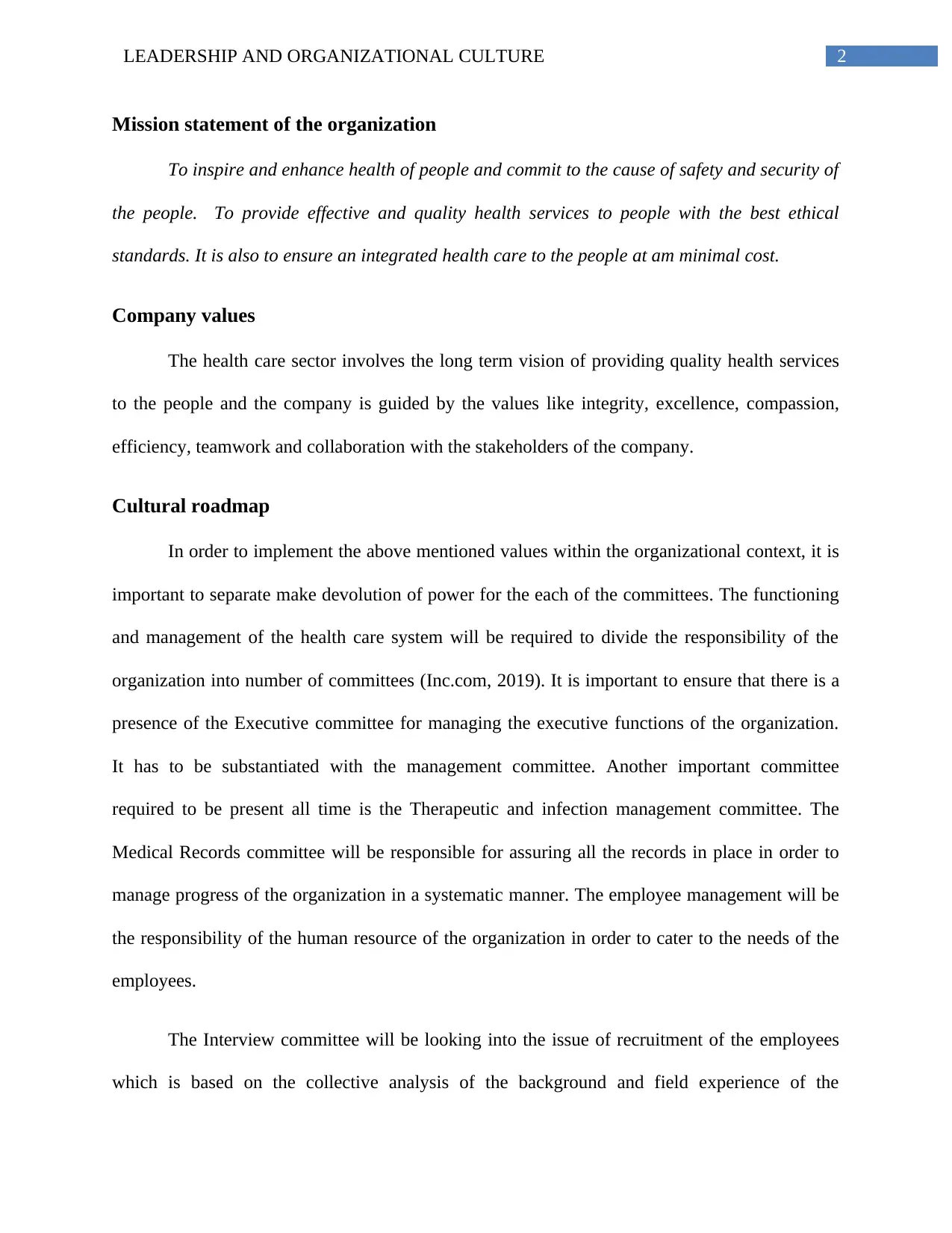
2LEADERSHIP AND ORGANIZATIONAL CULTURE
Mission statement of the organization
To inspire and enhance health of people and commit to the cause of safety and security of
the people. To provide effective and quality health services to people with the best ethical
standards. It is also to ensure an integrated health care to the people at am minimal cost.
Company values
The health care sector involves the long term vision of providing quality health services
to the people and the company is guided by the values like integrity, excellence, compassion,
efficiency, teamwork and collaboration with the stakeholders of the company.
Cultural roadmap
In order to implement the above mentioned values within the organizational context, it is
important to separate make devolution of power for the each of the committees. The functioning
and management of the health care system will be required to divide the responsibility of the
organization into number of committees (Inc.com, 2019). It is important to ensure that there is a
presence of the Executive committee for managing the executive functions of the organization.
It has to be substantiated with the management committee. Another important committee
required to be present all time is the Therapeutic and infection management committee. The
Medical Records committee will be responsible for assuring all the records in place in order to
manage progress of the organization in a systematic manner. The employee management will be
the responsibility of the human resource of the organization in order to cater to the needs of the
employees.
The Interview committee will be looking into the issue of recruitment of the employees
which is based on the collective analysis of the background and field experience of the
Mission statement of the organization
To inspire and enhance health of people and commit to the cause of safety and security of
the people. To provide effective and quality health services to people with the best ethical
standards. It is also to ensure an integrated health care to the people at am minimal cost.
Company values
The health care sector involves the long term vision of providing quality health services
to the people and the company is guided by the values like integrity, excellence, compassion,
efficiency, teamwork and collaboration with the stakeholders of the company.
Cultural roadmap
In order to implement the above mentioned values within the organizational context, it is
important to separate make devolution of power for the each of the committees. The functioning
and management of the health care system will be required to divide the responsibility of the
organization into number of committees (Inc.com, 2019). It is important to ensure that there is a
presence of the Executive committee for managing the executive functions of the organization.
It has to be substantiated with the management committee. Another important committee
required to be present all time is the Therapeutic and infection management committee. The
Medical Records committee will be responsible for assuring all the records in place in order to
manage progress of the organization in a systematic manner. The employee management will be
the responsibility of the human resource of the organization in order to cater to the needs of the
employees.
The Interview committee will be looking into the issue of recruitment of the employees
which is based on the collective analysis of the background and field experience of the
⊘ This is a preview!⊘
Do you want full access?
Subscribe today to unlock all pages.

Trusted by 1+ million students worldwide
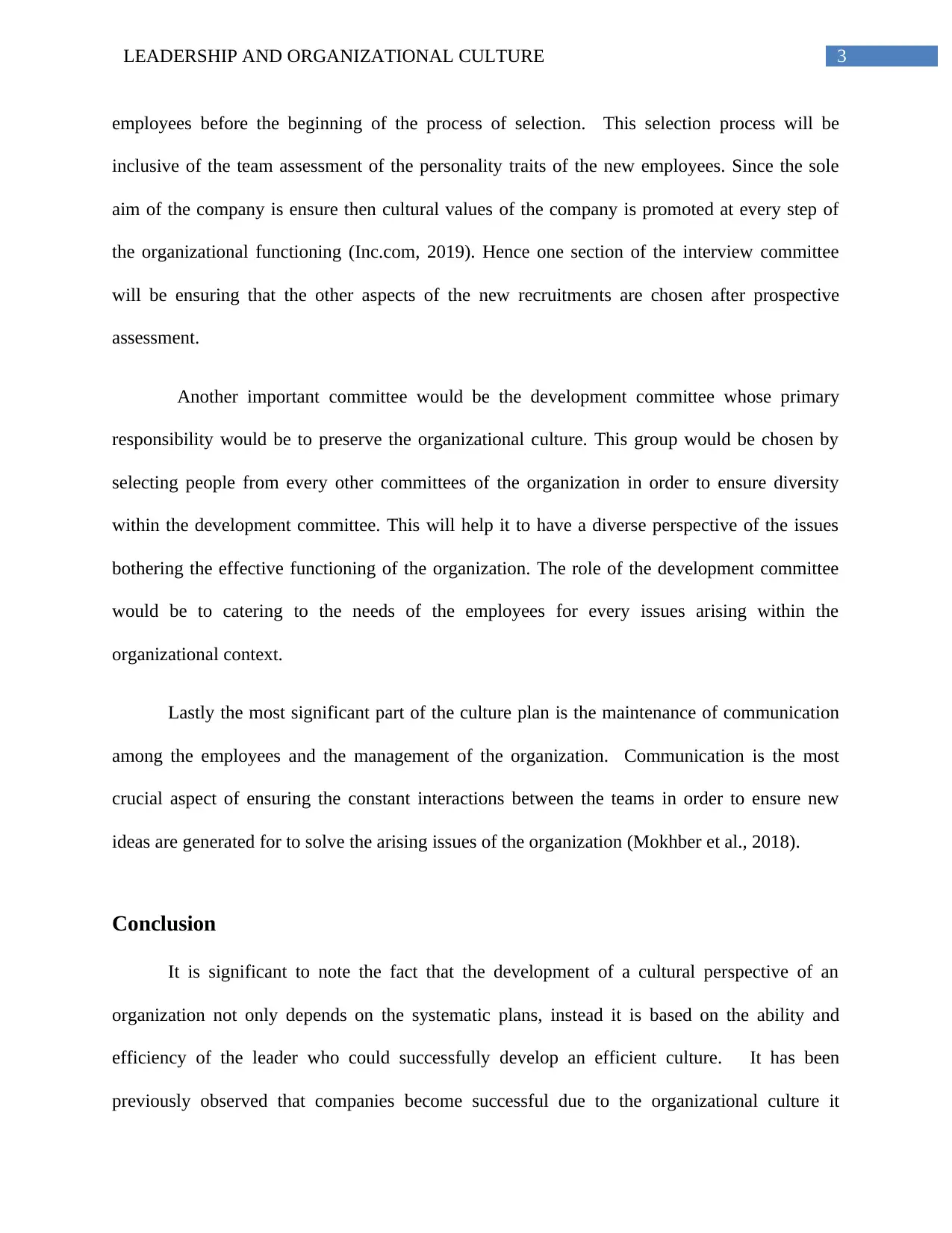
3LEADERSHIP AND ORGANIZATIONAL CULTURE
employees before the beginning of the process of selection. This selection process will be
inclusive of the team assessment of the personality traits of the new employees. Since the sole
aim of the company is ensure then cultural values of the company is promoted at every step of
the organizational functioning (Inc.com, 2019). Hence one section of the interview committee
will be ensuring that the other aspects of the new recruitments are chosen after prospective
assessment.
Another important committee would be the development committee whose primary
responsibility would be to preserve the organizational culture. This group would be chosen by
selecting people from every other committees of the organization in order to ensure diversity
within the development committee. This will help it to have a diverse perspective of the issues
bothering the effective functioning of the organization. The role of the development committee
would be to catering to the needs of the employees for every issues arising within the
organizational context.
Lastly the most significant part of the culture plan is the maintenance of communication
among the employees and the management of the organization. Communication is the most
crucial aspect of ensuring the constant interactions between the teams in order to ensure new
ideas are generated for to solve the arising issues of the organization (Mokhber et al., 2018).
Conclusion
It is significant to note the fact that the development of a cultural perspective of an
organization not only depends on the systematic plans, instead it is based on the ability and
efficiency of the leader who could successfully develop an efficient culture. It has been
previously observed that companies become successful due to the organizational culture it
employees before the beginning of the process of selection. This selection process will be
inclusive of the team assessment of the personality traits of the new employees. Since the sole
aim of the company is ensure then cultural values of the company is promoted at every step of
the organizational functioning (Inc.com, 2019). Hence one section of the interview committee
will be ensuring that the other aspects of the new recruitments are chosen after prospective
assessment.
Another important committee would be the development committee whose primary
responsibility would be to preserve the organizational culture. This group would be chosen by
selecting people from every other committees of the organization in order to ensure diversity
within the development committee. This will help it to have a diverse perspective of the issues
bothering the effective functioning of the organization. The role of the development committee
would be to catering to the needs of the employees for every issues arising within the
organizational context.
Lastly the most significant part of the culture plan is the maintenance of communication
among the employees and the management of the organization. Communication is the most
crucial aspect of ensuring the constant interactions between the teams in order to ensure new
ideas are generated for to solve the arising issues of the organization (Mokhber et al., 2018).
Conclusion
It is significant to note the fact that the development of a cultural perspective of an
organization not only depends on the systematic plans, instead it is based on the ability and
efficiency of the leader who could successfully develop an efficient culture. It has been
previously observed that companies become successful due to the organizational culture it
Paraphrase This Document
Need a fresh take? Get an instant paraphrase of this document with our AI Paraphraser
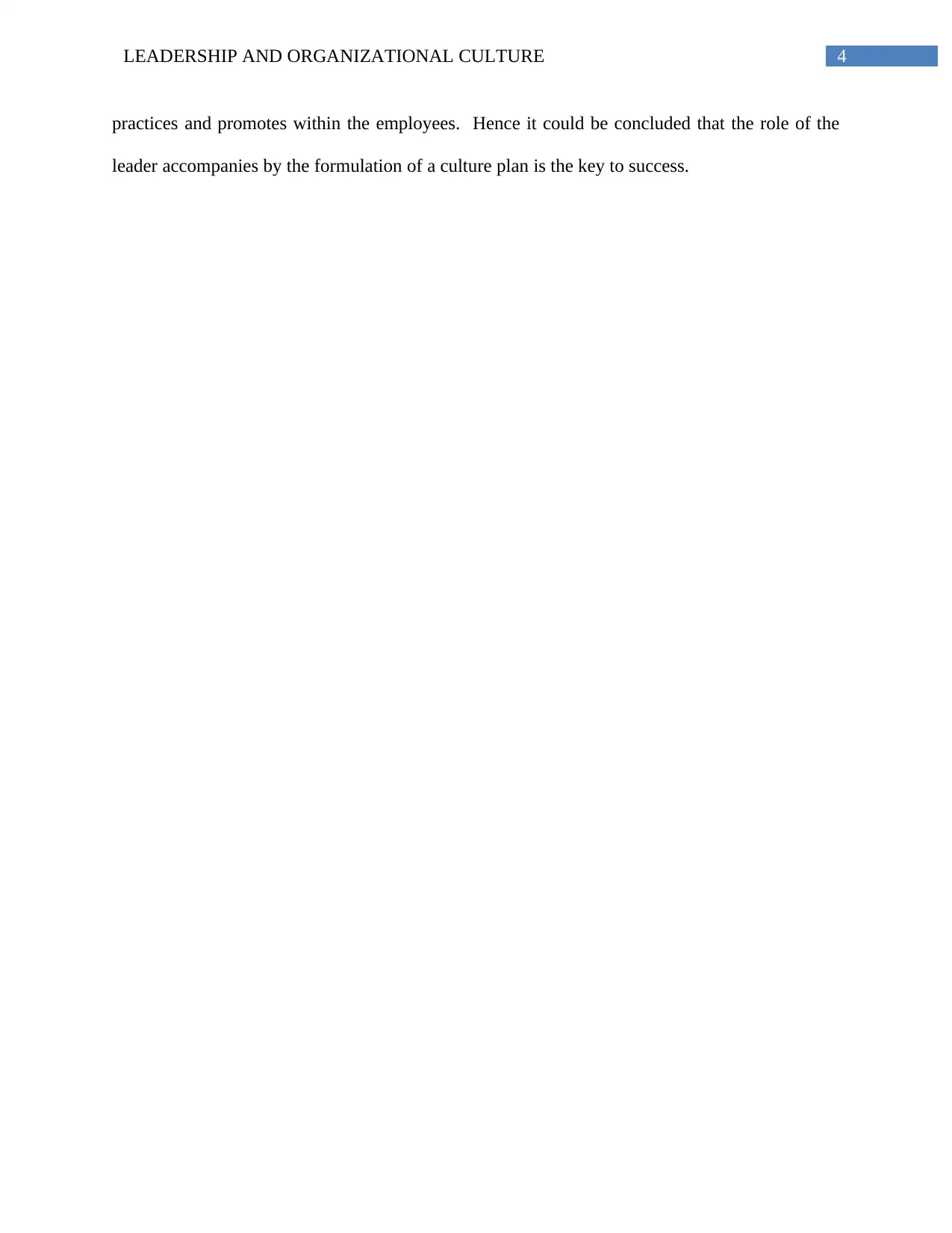
4LEADERSHIP AND ORGANIZATIONAL CULTURE
practices and promotes within the employees. Hence it could be concluded that the role of the
leader accompanies by the formulation of a culture plan is the key to success.
practices and promotes within the employees. Hence it could be concluded that the role of the
leader accompanies by the formulation of a culture plan is the key to success.
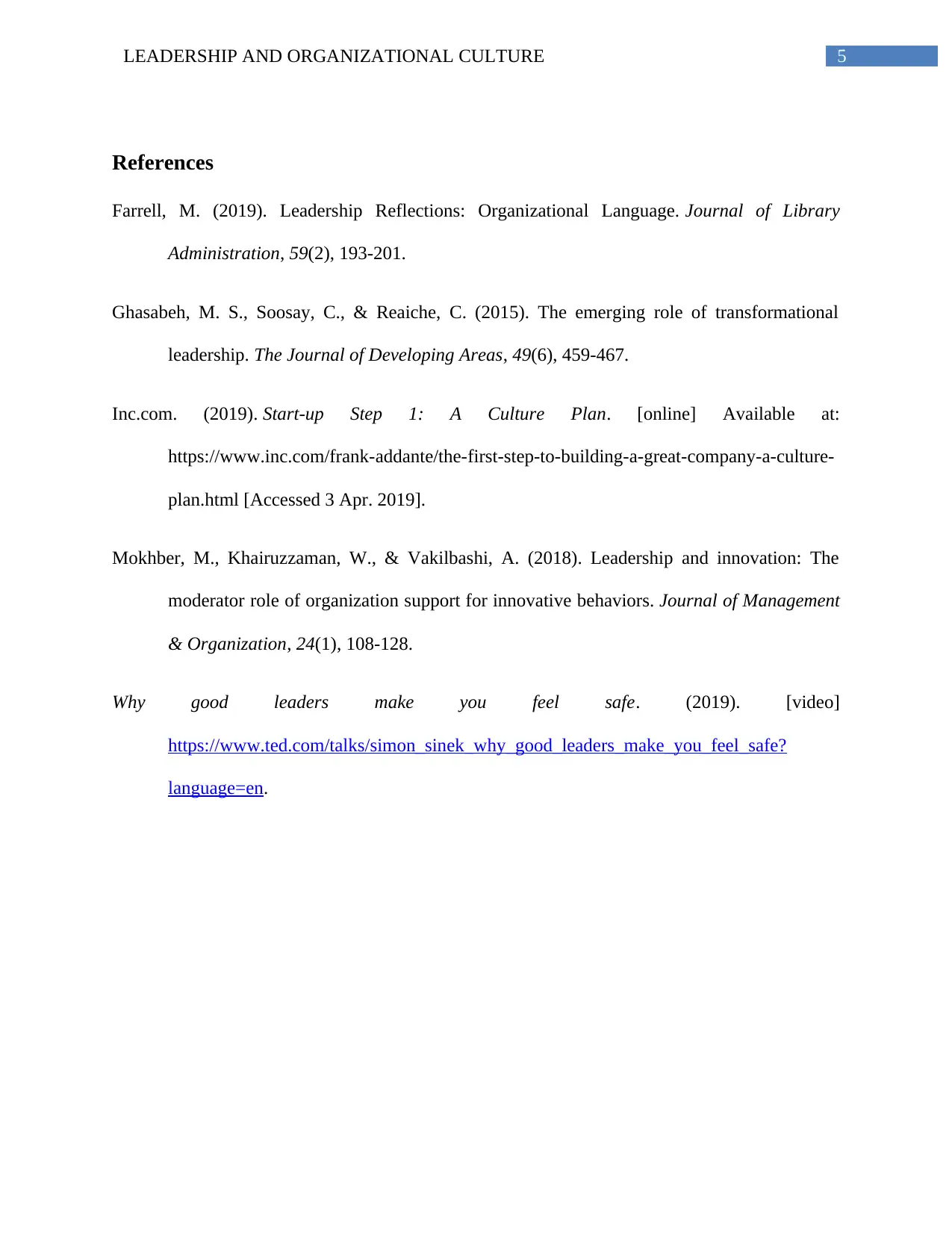
5LEADERSHIP AND ORGANIZATIONAL CULTURE
References
Farrell, M. (2019). Leadership Reflections: Organizational Language. Journal of Library
Administration, 59(2), 193-201.
Ghasabeh, M. S., Soosay, C., & Reaiche, C. (2015). The emerging role of transformational
leadership. The Journal of Developing Areas, 49(6), 459-467.
Inc.com. (2019). Start-up Step 1: A Culture Plan. [online] Available at:
https://www.inc.com/frank-addante/the-first-step-to-building-a-great-company-a-culture-
plan.html [Accessed 3 Apr. 2019].
Mokhber, M., Khairuzzaman, W., & Vakilbashi, A. (2018). Leadership and innovation: The
moderator role of organization support for innovative behaviors. Journal of Management
& Organization, 24(1), 108-128.
Why good leaders make you feel safe. (2019). [video]
https://www.ted.com/talks/simon_sinek_why_good_leaders_make_you_feel_safe?
language=en.
References
Farrell, M. (2019). Leadership Reflections: Organizational Language. Journal of Library
Administration, 59(2), 193-201.
Ghasabeh, M. S., Soosay, C., & Reaiche, C. (2015). The emerging role of transformational
leadership. The Journal of Developing Areas, 49(6), 459-467.
Inc.com. (2019). Start-up Step 1: A Culture Plan. [online] Available at:
https://www.inc.com/frank-addante/the-first-step-to-building-a-great-company-a-culture-
plan.html [Accessed 3 Apr. 2019].
Mokhber, M., Khairuzzaman, W., & Vakilbashi, A. (2018). Leadership and innovation: The
moderator role of organization support for innovative behaviors. Journal of Management
& Organization, 24(1), 108-128.
Why good leaders make you feel safe. (2019). [video]
https://www.ted.com/talks/simon_sinek_why_good_leaders_make_you_feel_safe?
language=en.
⊘ This is a preview!⊘
Do you want full access?
Subscribe today to unlock all pages.

Trusted by 1+ million students worldwide
1 out of 6
Related Documents
Your All-in-One AI-Powered Toolkit for Academic Success.
+13062052269
info@desklib.com
Available 24*7 on WhatsApp / Email
![[object Object]](/_next/static/media/star-bottom.7253800d.svg)
Unlock your academic potential
Copyright © 2020–2025 A2Z Services. All Rights Reserved. Developed and managed by ZUCOL.





